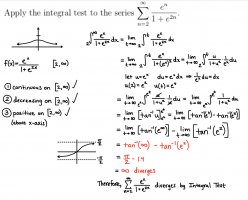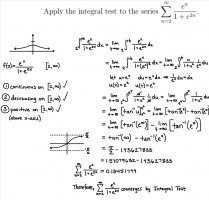You are using an out of date browser. It may not display this or other websites correctly.
You should upgrade or use an alternative browser.
You should upgrade or use an alternative browser.
Integral Test
- Thread starter I Love Pi
- Start date
BigBeachBanana
Senior Member
- Joined
- Nov 19, 2021
- Messages
- 2,277
Why do you think it diverges? You've shown otherwise, yet you concluded that it diverges?Hi, I am struggling to show that the given series diverges.
BigBeachBanana
Senior Member
- Joined
- Nov 19, 2021
- Messages
- 2,277
One comment about your work.I made the respective corrections. Thank you very much for your help!
Note that:
[math]\int_{2}^{\infty}\frac{e^x}{1+e^{2x}}dx\approx0.13452\\ \sum_{n=2}^{\infty}\frac{e^n}{1+e^{2n}}\approx 0.21153[/math]So it's incorrect for you to say this:

Also, you have both n and x.
It's sufficient to conclude that- By the integral test, since [imath]\int_{2}^{\infty}\frac{e^x}{1+e^{2x}}dx[/imath] converges, so is [imath]\sum_{n=2}^{\infty}\frac{e^n}{1+e^{2n}}[/imath]
Steven G
Elite Member
- Joined
- Dec 30, 2014
- Messages
- 14,596
I too have some comments on your work.
Do not use equal signs when you have an approximation.
What are the meaning of those check marks you put where it seems that you are justifying that you can use the integral test?
You need to show that an is a decreasing sequence! (or do you?)
You need to show that an>0 for all n! (or do you?)
You need to show that f(x) is continuous on [2,oo]!
Check marks mean nothing!
Please show us your work for the rest of the problem!
I will show you how I would show that an>0 for all n
en>0 for all n. So the numerator is positive.
e2n > 0 for all n.
1 + e2n > e2n >0 for all n. So the denominator is positive.
....
Do not use equal signs when you have an approximation.
What are the meaning of those check marks you put where it seems that you are justifying that you can use the integral test?
You need to show that an is a decreasing sequence! (or do you?)
You need to show that an>0 for all n! (or do you?)
You need to show that f(x) is continuous on [2,oo]!
Check marks mean nothing!
Please show us your work for the rest of the problem!
I will show you how I would show that an>0 for all n
en>0 for all n. So the numerator is positive.
e2n > 0 for all n.
1 + e2n > e2n >0 for all n. So the denominator is positive.
....
Last edited:


